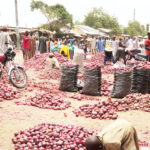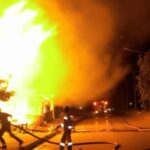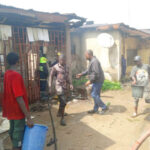Residents of Sokoto are still wondering how two shops belonging to a Hausa man and an Igbo man survived the recent inferno at the Shehu Shagari Central Market otherwise known as Sabon Kasuwa despite the fact that all the shops that surrounded them were burnt to ashes.
The fire, which started around 7 am, lasted for 10 hours before it was quenched by the combined efforts of the federal and state fire services.
- Ikorodu Bois, Emmanuella, Sallah, others nominated for 2021 Nickelodeon’s Kids’ Choice Awards
- Stop onslaught on Fulani Communities – Police warn
According to Governor Aminu Waziri Tambuwal, 60 per cent of the 14,000 shops were razed by the fire which he said was caused by an electrical fault from a transformer.
Our reporter learnt that the shops were separately located and none of their items was lost to the ravaging fire.
Surprising, the shop owned by the Hausa man, 30-year old Auwal Mamuda, contained plastic items that were considered inflammable.
Mamuda said that he started plastic business shortly after the 2006 fire disaster in the same market which destroyed pharmaceutical stores.
When asked how he reacted to the news on the fire outbreak, he said he was terrified because he had goods worth N10 million inside the shop.
“I thought they would all burn to ashes because the fire was more devastating in our side of the market,” he said.
On how he felt after seeing his shop intact, he said “I was grateful to God because I know it was not my making.
“What I always do is committing my shop and whatever is therein to God’s protection while closing for the day. I believe this is the only secret.
“If you are leaving your thing, secure it and leave God to do the rest. When you do that, you are sure of His protection,” he added.
Mamuda added that even though he had not incurred any loss to the fire, but some hoodlums who disguised as rescuers stole many of his properties.
Mamuda is now trading in a temporary makeshift shop along the market road because the state government had shut down the affected side of the market for renovations.
One of Mamuda’s neighbours in the market, Ummaru Mu’azu, said they were not surprised that his goods were spared by the fire because he (Mamuda) has been submissive to God and maintain a cordial relationship with his neighbours and business partners and is well behaved.
Another neighbour and relative of the young trader, Abubakar Altine, said: “God can try his servants in many ways, but what is expected from them is patience.” He described Mamuda as someone who is patient, respectful and maintains good relation with his relatives.
According to him, they have learnt a great lesson from the inferno because it showed to them that “ No condition is permanent because some of our leading traders suddenly turned poor as the fire gutted all their wares.
“So, the fire is a wake-up call for many of us. We should know that Allah who gives wealth can take it at any time. We should therefore be cautious in our dealings; do what God says we should do like paying Zakkat as at when due, give alms and maintain good relationships with our relatives, neighbours and business partners.
“With these, we can save our wealth from any calamity and prosper in our respective businesses,” he said.
The other shop that was spared by the fire belonged to Mr Emenike Okafor, a 43-year-old Igbo man from Enugu State.
Okafor like Mamuda, described the development as a “work of God” because he restocked the shop on Monday and the incident occurred on Tuesday but none of his items was razed by the fire.
“So, it is God that did this for me and I will forever be grateful to Him,” he said.
Daily Trust gathered that there were other shops also spared by the fire in the most affected areas.
However, Daily Trust Saturday was told that this is not the first time such a miracle would occur in the market as it was said that when the market was gutted by fire in 2006, only one shop remained standing and the shop belonged to a new Igbo convert.
However, Alhaji Kasimu Ruche, one of the leading dealers of clothing materials in the market, was not that lucky as he lost everything because all his shops were razed.
Ruche added that he also lost unspecified amount of money which he kept in the shop with the intention of taking it to the bank the following day.
According to him, over 50 people were working for him and many of them are the breadwinner in their families.
He noted that a lot of people were affected by the disaster and many of them may not come back unless they get support from the government.
Ruche, who has been trading in the market for over 40 years, said the recent disaster was more devastating than the one recorded in 2006 because then, most of the traders had evacuated their goods which were not so this time around.
The market was awarded by a military governor of the state, Umaru Muhammad, in the early 70s and was completed by the first civilian governor of the state, Alhaji Shehu Kangiwa.
The late President Shehu Shagari was said to be the chairman of the Sokoto Urban Development Agency now Sokoto Urban and Regional Development Planning Board when the market was awarded.
Daily Trust Saturday learnt that the market was built on a plot of land donated by Sultan Abubakar III.
Ruche noted that the best assistant the state government could provide to them was to allow the affected traders renovate their shops as closing the market would compound their already bad situation.
“The market is the biggest in this region and it serves the people of Sokoto, Kebbi, Zamfara and Niger states. Even people from the Niger Republic patronize the market because we have dealers who are in international business.
“Many people prefer buying from here than going to Kano because we give them a good price,” he said.
Sufyanu Falalu, whose sewing materials shop was also burnt, said he got the news about the fire on arrival from Lagos where he went to buy goods for the shop.
“When I was told that the market was on fire and my shop was razed, I became worried because some of the goods gutted by fire have not been paid for.
“You know, if a businessman is succeeding, he will get a lot of dealers who will be willing to supply him with goods on credits. This is common among our traders,” he said.
He reiterated the call on the state government to support the victims and allow them to renovate their shops themselves. “If they do that, the market will bounce back to life in no distance time,” he said.
Another victim of the disaster, Jamilu Bawa, said he was not able to remove a single thing from his cosmetics shop.
“I tried to remove the N450,000 I kept inside but to no avail because the fire was raging rapidly,” he said.
Bawa added that he and his brother who was selling Islamic medicines lost goods worth N7m to the fire.
Alhaji Inuwa, who also lost all his shops, said “I cannot talk now because I am devastated. All these places are my shops and they have all gone,” he noted.
The chairman of the verification sub-committee, Alhaji Namadina Abdurrahman, however, could not give the exact number of affected shops or quantify of the loss as according to him, their work was still in progress.
He noted that the committee was constituted to harmonise the reports of the market management and the traders on the quantum of losses.
“The claim made by the traders was outrageous, as a result, Governor Tambuwal directed the market management to do their own assessment and when they submitted their report there was a big disparity.
“This is why a committee was set up to look into the two reports and harmonize them,” he said.

 Join Daily Trust WhatsApp Community For Quick Access To News and Happenings Around You.
Join Daily Trust WhatsApp Community For Quick Access To News and Happenings Around You.

